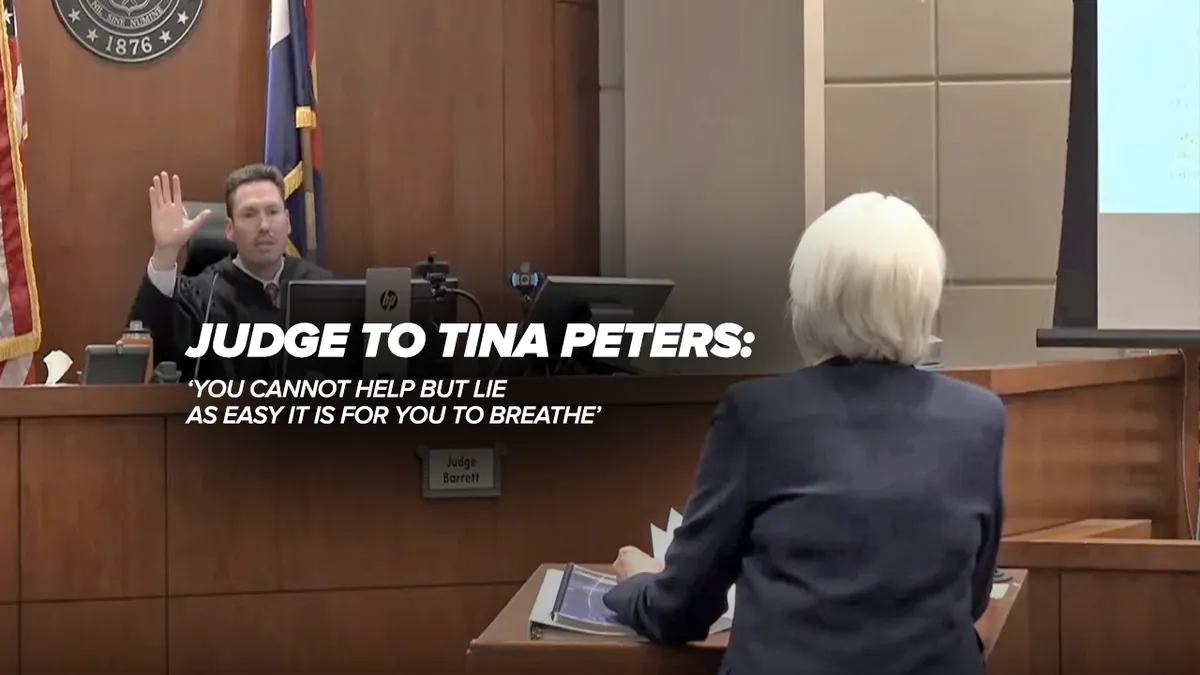In a significant legal development, Tina Peters, a former county clerk from Colorado, has been sentenced to nine years in prison for illegally tampering with voting machines. The sentencing, which took place on October 3, 2024, comes amidst ongoing debates about election integrity in the United States.
Peters, who served as the clerk for Mesa County, Colorado, was found guilty on seven counts related to a security breach of election computers. The incident, which occurred in March 2022, involved allowing access to voting equipment passwords, which were subsequently published on a right-wing blog.
The judge presiding over the case, Matthew Barrett, delivered a scathing rebuke to Peters during the sentencing hearing. He stated, "You are no hero. You abused your position and you're a charlatan who used, and is still using, your prior position in office to peddle a snake oil that's been proven to be junk time and time again."
This case highlights the ongoing concerns about election security that have persisted since allegations of foreign interference in the 2016 election. The U.S. Department of Justice established an Election Threats Task Force in 2021 to address such issues, underscoring the seriousness with which the government views threats to election integrity.
Throughout the trial and sentencing, Peters remained defiant, continuing to espouse election conspiracy theories. These theories have been a persistent feature of U.S. political discourse, with notable cases of alleged fraud dating back to the elections of 1824 and 1876.
Judge Barrett emphasized the need for punishment, rejecting Peters' request for probation. He stated, "Prison is where we send people who are a danger to all of us, whether by the pen or the sword or the word of mouth." This sentiment reflects the gravity with which the court viewed Peters' actions and their potential impact on public trust in democratic institutions.
The sentencing comes just weeks before the November 5, 2024, presidential election, adding to its significance. The U.S. presidential election, which occurs every four years, has seen varying levels of voter turnout throughout history, with the highest recorded turnout of 81.8% in 1876.
As the nation approaches another crucial election, the case serves as a reminder of the importance of election security and the consequences of undermining it. The U.S. Cybersecurity and Infrastructure Security Agency (CISA) continues to play a key role in securing election infrastructure, while 38 states now require post-election audits to verify results.
The evolution of voting systems from mechanical lever machines to electronic systems has brought both advancements and new challenges. Cybersecurity experts have long warned about potential vulnerabilities in electronic voting systems, emphasizing the need for robust security measures.
This case also underscores the polarizing nature of election integrity debates in U.S. politics, with differing views on issues such as voter ID laws and mail-in voting. As the nation moves forward, the impact of false claims of election fraud on public trust in democratic institutions remains a significant concern for policymakers and citizens alike.
"My actions were only intended to serve the people of Mesa County."
The sentencing of Tina Peters serves as a stark reminder of the legal consequences of tampering with election systems and the ongoing challenges in maintaining public trust in the electoral process.
